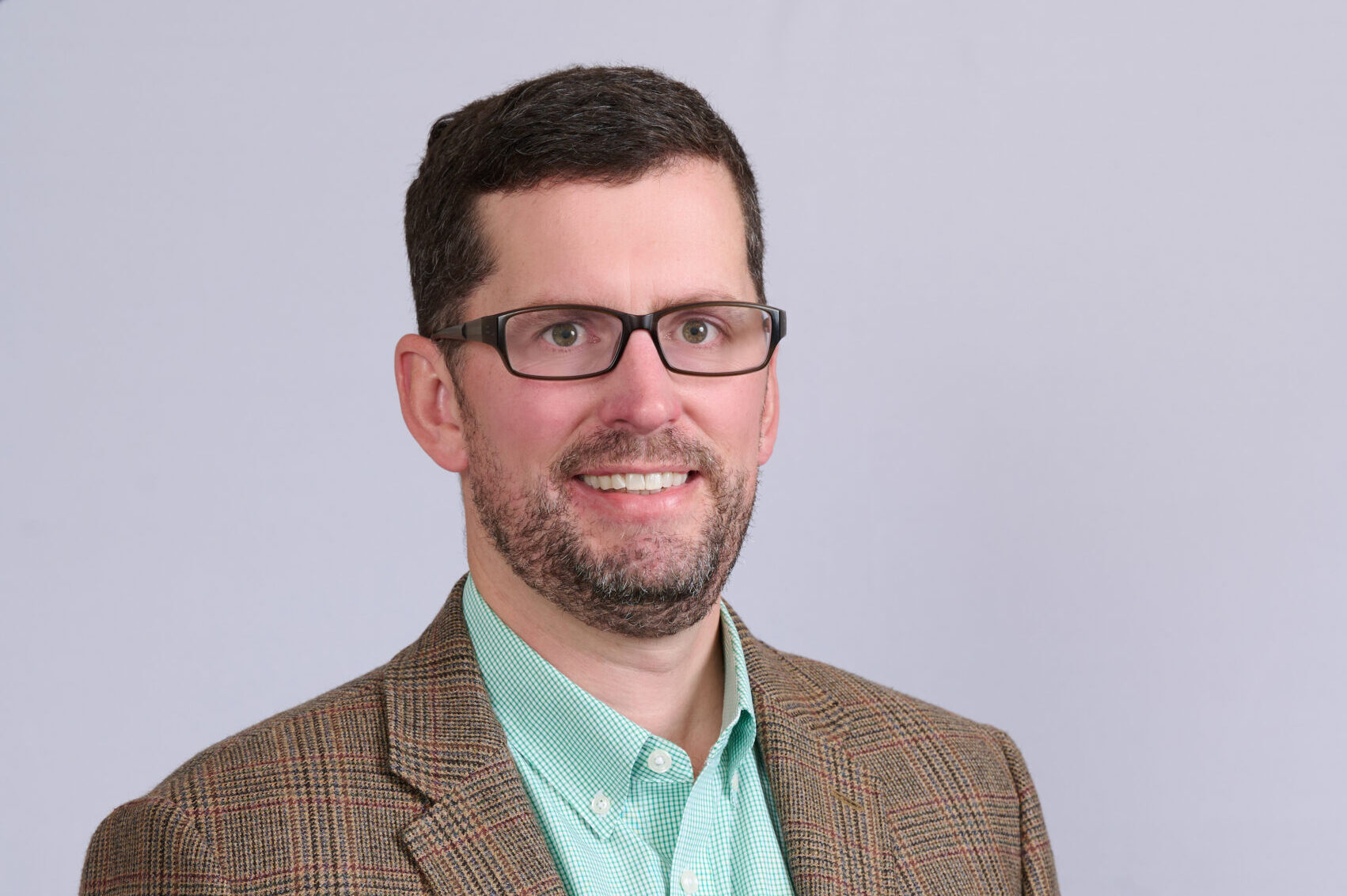
Does it seem like technology continually advances at a breakneck pace? What was once novel and revolutionary one day (remember music CDs?) becomes outdated and archaic the next (when was the last time you listened to a CD?) . Does it also appear that newer, more powerful technology is more affordable than ever before? TVs, Laptops, and even Echo Dots continue to increase their functionality, utility, and processing power at ever more affordable prices. If this is something you’ve witnessed it’s not an illusion and you’re not dreaming. It is a well-documented phenomenon called Moore’s Law and this discovery explains much of the rapid advancement of technology we’ve all seen.
What is Moore’s Law?
Moore’s law is not a law in the traditional legal sense, but more of an observation about technology that has more or less proved true. Gordon Moore, who co-founded Intel, observed that the number of transistors that can be fit on a silicon chip doubles about every two years. 1 In layman terms, this means that the processing power of computers and the like do not advance steadily in a linear fashion, but exponentially as time goes on. What’s even more remarkable, is that as the computational power increases, the cost to produce these chips also decreases. This is illustrated quite well in this chart from Britannica.com .
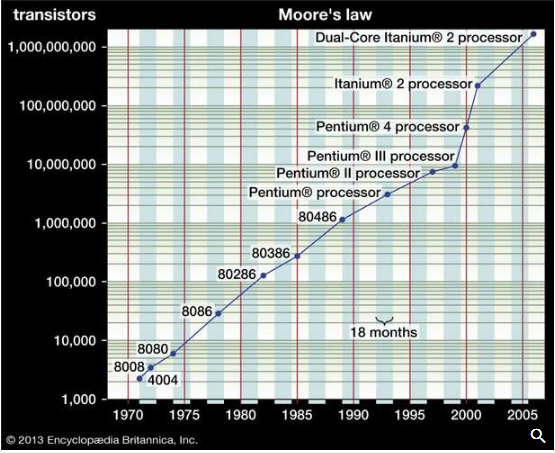
What does this mean for us?
Technology is incorporated in almost everything we do. As computers are able to process more and more information quickly and efficiently it opens up a world of opportunities. While the first computers could barely muster basic addition and subtraction , the computers of today are mapping the human genome and making self-driving autonomous vehicles nearly within reach. To process this much data requires an almost unimaginable amount of computation wh ich was not fathomable only a couple decades ago.
What this means for us is that technology, and all the advancements that come with it, are going to change the world in ways we cannot imagine today. This expands beyond tech, and also includes medical advances, improved farming and agriculture, a nd countless other areas of our lives . These advances, among other considerations, have sent life expectancy soaring and global poverty plummeting in only a few short decades.
Things have never been better
When we read the news it’s hard not to be bombarded with negative headlines. We hear that American life expectancy has been declining and that inequality has been expanding. Although we certainly have issues t o work on , what we don’t hear about is the incredible advances the world has made in such a short amount of time.
Life Expectancy:
Global life expectancy has exploded over the last century. It has more than doubled from about 35 years in 1913 to over 70 as of 2019. 2 More has been accomplished in this last century than the previous millennia before.
Much of this can be attributed to the rapid advancement of medical treatment s . Diseases like Polio or Smallpox that once scoured the Earth have essentially been eradicated. While new diseases, like the coronavirus , will arise, we have confidence that the great minds of the world, with the help of technology, will be more than capable to thwart these threats.
See below a chart from OurWorldInData.Org showing life expectancy from 1770-2019 :
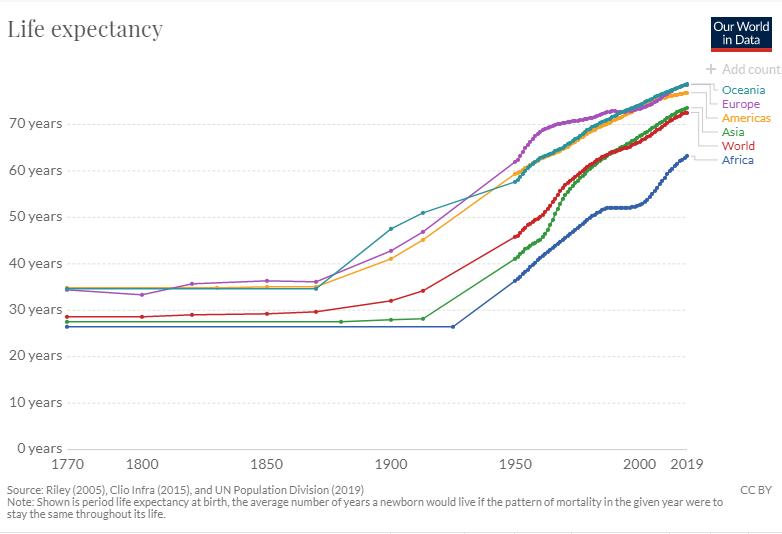
Global Poverty:
The rapid rise of life expectancy is incredible, but what may be even more remarkable is the decrease of those living in extreme poverty (less than $1 a day) around the globe. Not only are people living longer, but generally their quality of life has also improved substantially . M ore people having more money to spend and invest also contributes to global economic growth. See the chart below from OurWorldInData.Org
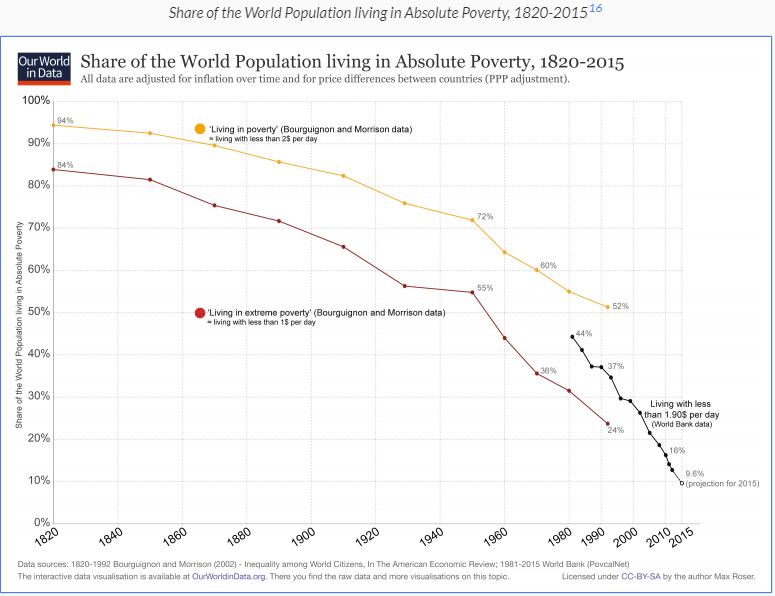
Population and Crop Yield:
If these advancements weren’t enough, all this has been accomplished in record time with more people on the planet than ever before. Global population has exploded because people are living longer, and better than they have in the past. On top of that, farmers have become incredibly more efficient in just the last 50 years producing more crops per unit of land. See the charts for g lobal population and crop yields from OurWorldInData.Org below.
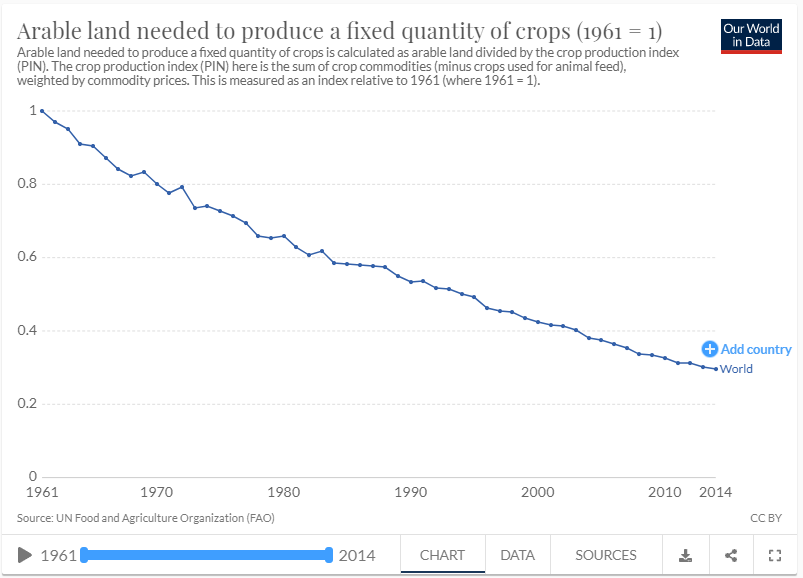
What does this mean for my financial planning?
While all this may be remarkable and fascinating, we would be remiss if we didn’t discuss some of the many financial planning considerations associated with Moore’s Law.
Longevity:
As shown above, life-expectancy has increased considerably in an extremely short period of time. Many diseases and ailments that were life threatening only a generation ago are manageable and curable today. Thanks to research and technology, it can only be expected that more and more diseases will be eliminated and treatable in the future.
In financial planning it’s common to use your parents or grandparents as an estimate of how long you might live, or what ailments may affect you. However, it is likely that many of these conditions that plagued our ancestors will be banished to the history books. While we don’t know what the future holds, or what new diseases will appear, for financial planning purposes it’s probably a good idea to plan to live longer than your ancestors did.
While it’s great that many people will be living longer, healthier lives, it also increases the amount of money people need to save. Expecting to have a longer retirement means that you’ll be living off your savings for more time. This means that future retirees will likely need to save more to e nsure their savings last through their lifetime.
Rapidly Changing World:
The pace at which the modern world changes will have an impact on younger and older workers alike. As technology continues to advance at an exponential rate, the processes and systems we use will constantly be changing. All workers will likely need to be nimble and adapt to these changes as they arise. Many believe that in the economy of the future people will change careers more often, and continually need to reeducate themselves to keep up in the modern world.
This can pose a significant problem for older workers. As job demands rapidly shift, older and younger workers , may find themselves out of work more frequently. We all like to think that ageism doesn’t exist, but unfortunately that’s not always the case. People plan for a set retirement age, but if they find themselves out of a job sooner, and unable to get a new one, their retirement plans may be unattainable. That’s why it’s critical to aggressively save before your desired retirement date in case you are unable to find a new job or are unable to work because of an injury or disability.
Younger works may have their own set of problems. As the economy becomes more globalized this means there will be more competition for jobs not just from those in your city, but from around the world. In order to stay ahead people will likely need to continually advance their education and retrain to the shifting job demands. A Bachelor’s degree may not be sufficient to compete in this ever-changing world. There are numerous online resources that aim to train individuals on specific skills outside the traditional classroom. Websites such ask LinkedIn Learning , Alison , Udemy , and Codecademy are a few resources more and more individuals are using to learn something new, or brush up on their current skills without committing to a full-time school schedule.
The Miracle of Compounding:
I f nothing else, we hope that Moore’s law provides another memorable example of the miracle of compounding. Einstein once said, “Compound interest is the 8th wonder of the world ” . As financial advisors , we are always encouraging our clients to save and invest to take advantage of compound interest. While we don’t know what the stock market will do day to day, historically it has always increased over time . W ith the rapid advances of technology and human improvement it’s unlikely this trend will stop in the future.
Compounding is a powerful force, whether it’s tied to interest, knowledge, or technological improvement. Being aware and taking advantage of this miracle will only benefit your financial plan, and your life.
Summary:
Moore’s Law may not have been specifically about financial planning, but its impact can be felt in this area. We don’t know what tomorrow or the next year will bring, but if Moore’s Law remains true it will change the world in more was than we can imagine. These changes will certainly bring unforeseen challenges, but based on history, we choose to remain optimistic that these advances will allow us all to live longer, healthier, more meaningful lives.
1 https://www.britannica.com/technology/Moores-law
2 https://ourworldindata.org/life-expectancy


